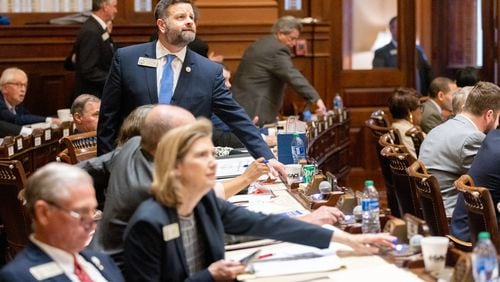The final, frantic day of lawmaking has arrived in Georgia, bringing crucial decisions on dozens of bills from immigration enforcement to election laws.
It’s a time of chaos and promise at the Georgia Capitol on the day known as Sine Die, the annual culmination of the General Assembly’s 40-day legislative session.
State lawmakers will vote on a $36 billion budget and could take up environmental protections for the Okefenokee Swamp, changes to election rules, restrictions on transgender youths and stricter immigration enforcement. It’s not clear whether legislators will vote on a proposal to allow sports betting in Georgia.
The General Assembly has already passed several major bills, including proposals to ease rules for new hospitals, defining antisemitism under the state’s hate crimes law, and creating an agency to investigate and punish “rogue” prosecutors.
Big money
Georgia’s government is flush with cash, and that means taxpayers and public employees will share the wealth.
In addition, legislators are considering a cap on how much home property assessments can increase in a year, limiting them to a 3% annual increase. And state homestead exemptions could also jump from $2,000 to as much as $10,000.
The $36 billion state budget would give pay raises to 300,000 teachers and state workers, and provide more money for police, education and mental health programs.
State employees would receive 4% raises — up to $3,000 — and teachers would get $2,500 more.
The General Assembly already approved a bill that would speed up income tax cuts, reducing the rate from 5.49% to 5.39%. Corporate income tax rates would also drop from 5.75% to 5.39%. Combined, Georgians and companies would save roughly $500 million next year.
Immigration
The killing of 22-year-old nursing student Laken Riley motivated Republican legislators to prioritize bills seeking more stringent immigration enforcement.
Pending bills would require local law enforcement and governments to cooperate with federal immigration authorities, preventing sheriffs from releasing people from jail after they’ve posted bail instead of holding them for potential deportation.
One measure, House Bill 1105, would require law enforcement officers to verify the immigration status of people they arrest and require sheriffs to comply with requests from U.S. Immigration and Customs Enforcement to detain them for an additional 48 hours until they can be transferred to federal custody.
Another proposal, House Bill 301, would allow any citizen to sue local government officials who they don’t believe are enforcing immigration laws.
Okefenokee Swamp
Advocates seeking to protect the Okefenokee Swamp are hoping for a late-session bill that would curtail future mining.
The legislation, Senate Bill 132, wouldn’t prevent state environmental authorities from issuing permits for a 582-acre mine along the east side of the Okefenokee.
But the bill would pause permitting of new mines that use the same kind of “dragline” technique to dig up a compound used in toothpaste and paint.
Despite broad support for conserving one of Georgia’s natural treasures, the bill hasn’t advanced in the state Senate after clearing the state House on Tuesday.
It’s uncertain whether the legislation will advance Thursday or die without receiving a vote in the Senate.
Election laws
A variety of changes to Georgia’s election laws could receive final votes Thursday, with bills that would set criteria to challenge voters’ eligibility, allow election officials to reduce the number of voting machines on election day and criminalize deceptive “deepfake” political ads.
The Republican-sponsored package of bills would alter how the state conducts elections in many ways.
Mass challenges to voters’ eligibility — a cause taken up by conservative activists who say they want to remove outdated voter registrations — would be upheld if they can show someone voted in another state, claimed a homestead exemption in a different jurisdiction or registered at a nonresidential address. But challenges wouldn’t be considered within 45 days of an election, and students and members of the military would be protected.
The package of bills would also allow county election directors to reduce the number of voting machines on election day to reflect expected turnout, create ballot handling standards and post ballot pictures online for public review.
In addition, lawmakers are considering adding watermarks to ballots, increasing the number of election audits and eliminating the use of computer-generated QR codes to count votes.
Culture war
Republican leaders in the state Senate are pursuing several bills dealing with transgender bathroom use, sex education and puberty blocking medication.
Transgender students would be banned from using bathrooms or locker rooms that align with their gender identity under House Bill 1104. Republicans effectively already banned transgender girls from sports in 2022, when they encouraged the Georgia High School Association to change its policy, which it did.
Sex education would be prohibited in schools before sixth grade, and students would not receive any sex education unless parents opt in. If requested, parents would be informed about every book their children check out from a school library.
A separate measure, House Bill 1170, would restrict puberty blocking medication for transgender children under age 18. The Legislature restricted hormone replacement therapy for trans minors last year.
Check on the legislation that interests you
To follow the progress on individual bills and resolutions, go to The Atlanta Journal-Constitution’s Bill Tracker at ajc.com/bill-tracker.









